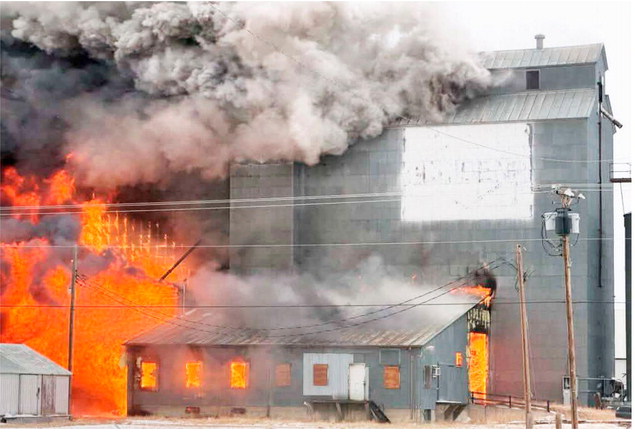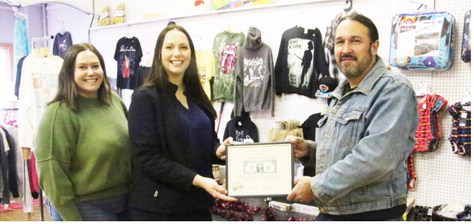Attorneys Run For District Judge Seat
Benjamin J. Fosland and Janet Christoffersen are on the ballot for 15th Judicial District Judge. Longtime judge David Cybulski is retiring from the position.
The general election is scheduled for Nov. 5. Ballots will be mailed to absentee voters on Oct. 11.
The candidates answered the following questions from this newspaper.
1. What experience do you have that you feel would benefit you if you are elected to this position?
Fosland: “I have gained a broad professional experience in both the criminal and civil areas over the past 12 years. My civil practice ranged from litigation to transactional work on real estate deals, probates and estate planning, water rights, oil and gas. In the criminal arena I’ve prosecuted cases in municipal, justice, and district courts, handled a wide range of felonies and misdemeanors, and tried multiple cases in front of juries. In short, I have a broad range of experience in the types of cases that come before a district court and know how those cases should progress through the court system.
Christoffersen: While I’ve practiced pretty much every type of law over the last 22 years, I think life experience has provided me with an impartial view into the emotions and motivations of legal disputes. I’ve worked with numerous lawyers with different practicing styles as well as judges with different approaches to deciding cases. While I was one of the top students in my law school, true wisdom came from years of practice and getting knocked around a bit.
2. What do you view as the biggest challenges facing the office?
Christoffersen: The biggest challenge facing the judicial system in northeastern Montana is the lack of qualified attorneys to assist people in legal disputes. In that regard, the Court has seen more pro se litigants, which means more work for the judiciary. Without qualified attorneys advocating for their clients and providing the Court with the legal arguments, the judiciary is left making sure the correct law is applied to each case. It can create an unfair advantage to those who do secure competent counsel against pro se litigants who cannot.
Fosland: Caseload and access to justice are perennial issues across the state and nation, but I’ve seen it first hand in my private practice over the past 12 years. The attorneys in the area are all overflowing with work, there’s just not enough of us. As a result people are prevented from having representation, and often from seeking help from the courts period. In connection with my answer to Number 7 below, I believe the District Court could help ease the access to justice issues by working to recruit law clerks and interns. By doing so we will allow more attorneys to experience northeast Montana and, with a little luck, convince a few of them to make their careers here.
3. How many hours a week do you feel that elected officials should commit to the position? How many hours should they spend in the office?
Fosland: Elected officials should commit as much time as necessary to efficiently and effectively fulfill their duties. I come from a small business and entrepreneurial background, and I understand that everyone’s time is their most precious resource. I also come from nearly 10 years as a county attorney, effectively being “on call” 24 hours per a day. When big cases or trials are coming up I work much more than 40 hours per week. And when the number of cases are down in a year, I want to make the most of that too, because the next big case could pop up at any moment. I’ve always done my best to prioritize my workload and give pressing matters highest priority. So I cannot say that an elected official should spend 20 or 40 or 60 or 80 hours in the office, because time in the office and time spent working are not the same thing. Caseloads and workloads will naturally ebb and flow. At any given time elected officials should spend the amount of time working in the office that is necessary to do their job in an efficient and effective manner.
Christoffersen: Every job requires the amount of hours necessary to competently do the job.
4. What partnerships or relationships are important to the office?
Christoffersen: The judiciary is an impartial and to some extent isolating position. Some agencies, however, rely on access to the judiciary for search warrants and juvenile matters. In civil matters, private attorneys should not have an advantage with the judiciary.
Fosland: Good working relationships with court staff, area attorneys, and neighboring judges are all important to the office of a district court judge. The absence of relationships with any of those groups will create unnecessary conflict and dysfunction in the operation of the court system. Citizens come to the courts often as a last resort, and should have their cases adjudicated fairly, impartially, and without unnecessary delay. I am proud to say that I have built these relationships during the course of my career and would be able to take on the role of district judge having good working relationships in all three counties of the district, as well as the neighboring judges.
5. What do you feel makes you qualified to serve in the judge’s position?
Fosland: My experience, temperament, and commitment to this area are three qualities that I feel make me uniquely qualified to serve in the judge’s position. Concerning my experience, and as stated above, I have a broad knowledge base from years spent as both a private practice attorney and a prosecutor. I served a one-year clerkship as a law clerk for Hon. David Gratton, Chief
Judge of the Idaho Court of Appeals, and was able to observe the work of appellate courts. I have handled almost every type of case that a district court is likely to encounter, and have worked in front of the district court judge in various trials, hearings, etc., multiple times per month over the past 10 years. Concerning my temperament, I am even-tempered and believe that logic and the law should dictate outcomes, not emotional responses. Even in difficult and high stakes cases, I have always endeavored to advocate for my clients while treating everyone in a fair and professional manner.
Concerning my commitment to this area, I was born and raised in Scobey, left for approximately 10 years while attending college and my Court of Appeals clerkship in Boise, Idaho, and then returned. In my career, I have worked almost exclusively in the three counties of this district. I know the area and I know the people. I have worked shoulder-to-shoulder with clients to care for their loved ones, to start their dream businesses, and grow their agricultural operations. My wife and I have started our own businesses here and actively participate in helping area non-profits raise funds for various projects. We feel that northeast Montana is our home and is truly a land of opportunity. Because of my commitment to being here, I am also invested in ensuring the court system operates for the people of this area in a fair and effective manner.
Christoffersen: As explained in the first question, I have practiced almost every type of law. Further, I’ve had numerous trials and am experienced in trial procedures. Most importantly though, I don’t have strong opinions regarding anything other than the application of the law to the facts and ensuring fairness for every party that may come in front of me.
6. Please provide examples illustrating the strong judgment you possess that is needed to serve the county’s residents?
Christoffersen: Impartiality is my strongest judgment. Last names, the attorney you hire or are provided with by the State, should not influence the judiciary. In the end, it isn’t about who is right or wrong, but how the facts apply to the current law. There are always two sides to every story and not each get published. Strong knowledge of the law and ability to research are also key to queuing in on the relevant facts and making sound decisions to reduce unnecessary further court proceedings.
Fosland: Within the context of the law, prosecutors are given a lot of power and discretion in how to carry out their work. In my work as a prosecutor I have endeavored to be fair and consistent across cases and charges, which necessarily involves tough calls. I have declined to charge cases when it was apparent a crime occurred but there was insufficient evidence to prove the case. I have dismissed charges in cases when I did not believe proper procedures were followed. And I have persisted with criminal charges when there was sufficient evidence of the crime even if my decision was unpopular amongst certain groups within the community. In short, I have always worked to apply the law in an objective manner and to ensure that all parties were treated fairly.
7. What role do you see the position should play in improving the quality of life in the area? What are strengths, challenges of area?
Fosland: I believe the District Court Judge could have a strong impact and role in bringing additional professionals to the area. Through clerkships and internships, the district court could be bringing law students and newly-admitted attorneys to experience northeast Montana. We sorely need more professionals in our corner of the state, attorneys, accountants, and corporate professionals. Those currently operating in the area are rapidly aging out and there are too few lined up to replace them. I would like to work in earnest to get more attorneys out here, knowing that it takes a special individual to see the beauty of the northern plains. In the words of Willa Cather, “Anybody can love the mountains, but it takes a soul to love the prairie.” The greatest strength of this area is its people, and the warm, tightknit communities that exist here. There is easy access to recreation, plenty of job opportunities, relatively low crime, and lower cost housing than a lot of Montana. The challenges are the same as they’ve always been, the winters, the difficulty in accessing goods and services in such a remote region, and the higher cost of food and fuel as a result of being “in the middle of nowhere”. Despite those challenges my outlook on this area has always been and continues to be positive. I firmly believe northeast Montana is the place where the sky’s the limit, as long as you’re willing to put in the work.
Christoffersen: Fair decisions made efficiently and without causing further disruption and attorney fees for litigants is key. The area is isolated and with that comes a lack of competent attorneys willing to work in the area. Providing access to video hearings for out of area attorneys and other accommodations opens the door for area residents to access affordable competent counsel out of the area.

